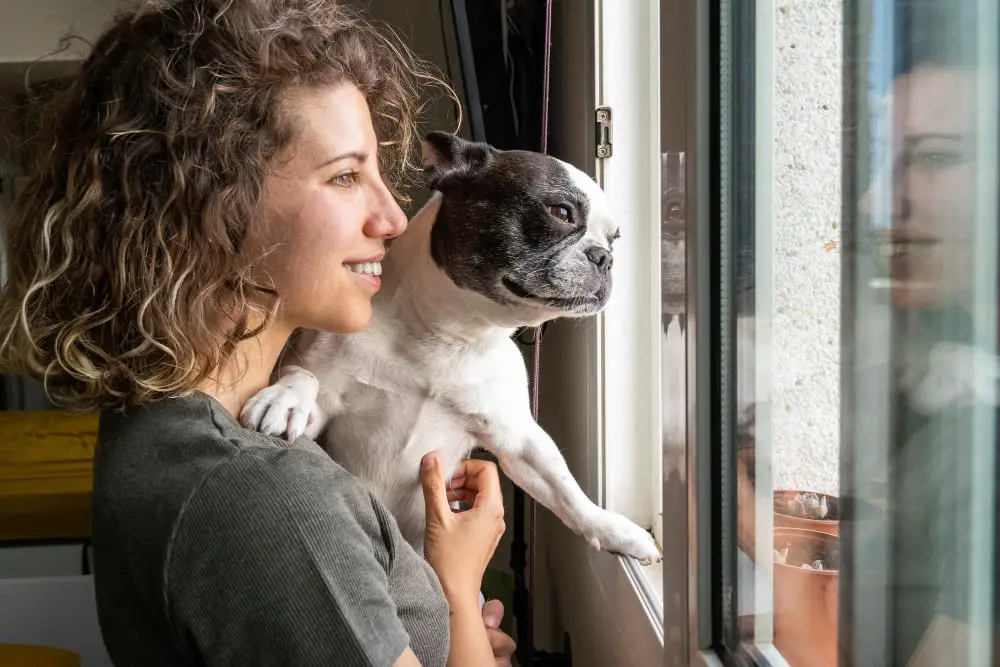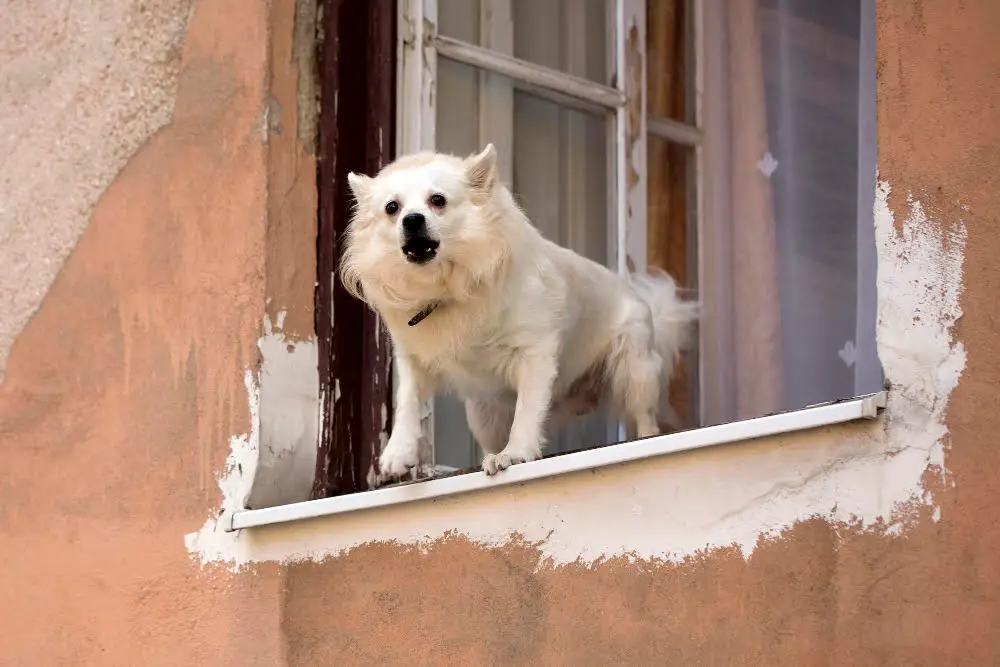Discover the intriguing reasons behind your canine companion’s habit of gazing out the window in this informative blog post.
As a homeowner, you may have noticed your furry friend staring out the window for hours on end. Whether it’s watching birds fly by or keeping an eye on the neighborhood, dogs seem to be fascinated by what’s happening outside.
But why do they do this? Is it just a form of entertainment or is there something deeper going on? In this blog post, we’ll explore the reasons behind why dogs look out the window and what it can tell us about their behavior. So grab a cup of coffee and let’s dive in!
Key takeaways:
- Dogs are naturally curious creatures and love to observe the world outside.
- Looking out the window provides dogs with sensory stimulation and mental exercise.
- Dogs may stare out the window to monitor their territory and potential threats.
- Some breeds are more prone to window gazing due to their instincts.
- Looking out the window can provide social connection and alleviate boredom for dogs.
Canine Curiosity

Dogs are naturally curious creatures, and their interest in the world around them is one of the reasons they love looking out windows. They want to know what’s happening outside, whether it’s a squirrel running up a tree or a neighbor walking their dog down the street.
This curiosity is an essential part of their nature and helps keep them mentally stimulated.
When dogs look out windows, they’re not just staring blankly at nothing; they’re actively engaging with their environment. By watching what’s going on outside, dogs can learn about different sounds and smells that may be unfamiliar to them.
This sensory stimulation can help prevent boredom and provide mental exercise for your furry friend.
However, it’s important to note that excessive window gazing could lead to behavioral issues such as barking excessively or becoming overly anxious when separated from you or other family members.
Sensory Stimulation

When they look out the window, they are exposed to various stimuli that can trigger their senses. The movement of leaves or cars passing by can catch their attention and stimulate their visual perception.
The sound of birds chirping or dogs barking in the distance can activate their auditory system.
Moreover, dogs use scent as a way to gather information about what’s happening outside. They may sniff around the windowsill or stick their nose out for fresh air to pick up scents from other animals or people passing by.
All these sensory inputs provide mental stimulation for your dog which is essential for keeping them mentally healthy and happy. Sensory stimulation helps prevent boredom which is one of the leading causes behind destructive behavior in dogs such as chewing on furniture.
Instinctual Behaviors

When your dog is staring outside, it’s not just because they’re bored or curious; it’s also because they’re keeping an eye on potential threats to their territory. This behavior is especially common in breeds that were originally bred for hunting or guarding purposes.
For example, terriers have a strong prey drive and will often watch birds or squirrels from the window with intense focus. On the other hand, guard dogs like German Shepherds may be more interested in monitoring any suspicious activity around their home.
It’s important to understand that these instincts are deeply ingrained in your dog’s DNA and cannot be trained out of them completely. However, you can manage this behavior by providing alternative forms of stimulation such as puzzle toys or interactive games when you notice excessive barking at passersby through windows.
Territory Monitoring

One of the reasons why dogs look out the window is to monitor their territory. They want to keep an eye on any potential threats or intruders that may enter their space.
This behavior is especially common in breeds that were originally bred for guarding purposes, such as German Shepherds or Rottweilers. However, even smaller breeds like Chihuahuas can exhibit this behavior.
When your dog looks out the window and barks at passersby or other animals outside, it’s not just because they’re being noisy – it’s because they’re trying to alert you of potential danger. While this can be helpful in some situations (such as if someone tries to break into your home), excessive barking can also become a nuisance for both you and your neighbors.
To address this issue, consider training techniques that teach your dog when it’s appropriate to bark and when it’s not. You could also try distracting them with toys or treats whenever someone walks by outside so that they learn there isn’t always something worth barking about.
Guarding the Property

When a dog sees someone or something approaching its home, it may bark or growl as a warning signal. This behavior can be especially prevalent in breeds that were originally bred for guarding purposes such as German Shepherds and Rottweilers.
While this instinctual behavior can be beneficial in keeping your property safe from intruders, it’s important to train your dog not to bark excessively at every passerby. Excessive barking can lead to noise complaints from neighbors and even legal issues if left unchecked.
To prevent excessive barking while still allowing your dog to monitor its surroundings, consider using distraction techniques such as providing toys or treats when visitors approach. Training techniques like positive reinforcement can help teach your furry friend appropriate behaviors when guarding the property.
Watching for Prey

Even if they’re domesticated pets, dogs still have a strong desire to hunt and chase after small animals like squirrels or birds. When your dog is staring out the window intently, it’s likely that they’ve spotted something moving outside.
Watching for prey can be both entertaining and frustrating for pet owners. On one hand, it’s fascinating to see your dog in action as they track their target with laser-like focus.
On the other hand, excessive barking or attempts at escape can become problematic if left unchecked.
If you notice that your dog is fixated on a particular area of the yard or street outside your home where there may be wildlife present (such as rabbits), consider blocking off access to this area so that he cannot get too close. Alternatively, you could try redirecting his attention by providing him with interactive toys such as puzzle feeders which will help satisfy his hunting instinct without causing any harm.
It’s important not only from an ethical standpoint but also from a legal perspective since many areas have laws against allowing dogs off-leash in public spaces where wild animals might live.
Social Connection

Looking out the window can be a way for them to feel connected to their owners, even when they’re not in the same room. When you leave your dog at home alone, they may look out the window as a way of waiting for your return or watching for any signs of your arrival.
In addition to monitoring their surroundings, dogs may also use this time to connect with other animals outside. They might bark at passing dogs or wag their tail at friendly neighbors walking by.
This type of socialization can help keep them mentally stimulated and prevent boredom while you’re away.
However, it’s important to note that excessive barking or aggression towards passersby could be a sign of anxiety or territorial behavior that needs addressing through training techniques such as positive reinforcement methods.
Looking out the window is just one way our furry friends stay connected with us and engage with their environment while we’re away from home.
Waiting for Their Owners to Come Home

It’s no surprise that they eagerly await the return of their human companions when they’re away from home. For many dogs, looking out the window is a way to pass the time until their owners come back.
They may even recognize certain sounds or sights associated with your arrival, such as the sound of your car pulling into the driveway or seeing you walk up to your front door.
This behavior can be particularly common in dogs who suffer from separation anxiety when left alone at home. Watching for signs of an owner’s return can provide comfort and reassurance during what might otherwise be a stressful time.
However, it’s important not to encourage excessive waiting by making too much fuss over them upon returning home – this could reinforce anxious behaviors in some cases.
Boredom Management

When they’re left alone for long periods of time, they can become bored and restless. Looking out the window is one way dogs manage their boredom when their owners aren’t around.
If your dog spends a lot of time staring out the window, it may be a sign that he needs more mental stimulation in his life. Consider providing him with puzzle toys or interactive games to keep his mind engaged while you’re away.
It’s also important to make sure your dog gets enough exercise each day. A tired dog is less likely to become bored and destructive than an energetic one.
While looking out the window can help alleviate boredom in dogs, it’s important not to let them do so excessively as this could lead them into developing obsessive-compulsive behaviors such as excessive barking or even aggression towards passersby outside.
Exercise Alternative

Dogs need physical activity to stay healthy and happy, but sometimes it’s not possible for owners to take them on long walks or runs due to various reasons such as bad weather or busy schedules. In these cases, window gazing can provide some much-needed stimulation and entertainment for your furry friend.
By watching the world outside from their cozy spot indoors, dogs are able to engage in mental exercises that keep their minds sharp and active. They may track moving objects with their eyes or listen intently for sounds coming from outside.
This type of sensory stimulation is important for maintaining cognitive function in dogs of all ages.
However, it’s important not to rely solely on window gazing as an exercise alternative since it doesn’t provide enough physical activity alone. It should be used alongside other forms of exercise like playing fetch or going on walks so that your dog stays fit both mentally and physically.
Habit Formation

Once they discover the joys of watching the world go by from their favorite spot, it’s hard to break them out of this habit. However, excessive window gazing can lead to problems such as barking at passersby or becoming overly anxious when left alone in a room without access to windows.
To prevent these issues from developing into more serious behavioral problems, it’s important for dog owners to establish boundaries around window time. This could mean limiting how long your dog is allowed to look out the window each day or training them not to bark at people passing by.
Breed Differences

Some breeds, such as the Border Collie and Australian Shepherd, have a natural instinct to herd and may be more prone to staring out the window in an attempt to monitor their territory. On the other hand, breeds like Greyhounds or Bulldogs may not show as much interest in looking outside due to their physical limitations or lack of prey drive.
Some smaller dog breeds tend towards barking at anything they see through windows while larger ones might just watch silently without making any noise. Understanding your dog’s breed characteristics can help you better understand why they behave certain ways around windows.
Emotional Responses

When it comes to looking out the window, dogs may experience a range of emotions depending on what they see outside. For example, if they spot another dog or a person walking by, they may feel excited or anxious and start barking.
On the other hand, if there’s nothing interesting happening outside for an extended period of time while waiting for their owners to come home from work or school – dogs can become bored and restless.
Some dogs might look out the window as a way to alleviate separation anxiety when left alone at home. They could be searching for any signs that indicate that you’re coming back soon.
It’s important to understand your dog’s emotional responses when looking out the window so you can address any issues related to excessive barking or destructive behaviors like chewing furniture due to boredom-induced stress.
Effects On Dog’s Mental Health

For some dogs, excessive barking or anxiety while looking out the window can indicate underlying issues such as separation anxiety or fear of strangers. If a dog is constantly fixated on what’s happening outside instead of engaging in other activities like playtime or exercise, they may become bored and restless.
On the other hand, allowing your dog to safely observe their surroundings from inside can provide mental stimulation and prevent boredom. It also allows them to feel more connected with their environment and potentially reduce stress levels.
As with any behavior exhibited by our furry friends, it’s important for pet owners to monitor how much time their dog spends at the window and address any concerning behaviors that may arise.
Addressing Excessive Barking

While some dogs may bark occasionally to alert their owners of potential danger or strangers approaching the house, others may bark excessively out of boredom or anxiety. If this is the case with your furry friend, there are several ways to address this behavior.
Firstly, try to identify what triggers their barking and eliminate those stimuli as much as possible. For example, if they tend to bark at people passing by on the street outside your home or other animals in neighboring yards – consider blocking off that particular view from them.
Secondly, provide alternative forms of entertainment for them such as interactive toys or puzzles that will keep them occupied while you’re away from home.
Thirdly, reward good behavior when they remain calm during times when they would typically start barking excessively. Positive reinforcement can go a long way in helping change unwanted behaviors over time.
Training Techniques

One of the most effective methods is redirection. This involves distracting your dog with an alternative activity when they start staring out the window excessively.
For example, if you notice that your furry friend has been watching outside for too long, try calling them over and engaging them in a game or giving them a chew toy to play with instead. You can also teach your dog commands like “leave it” or “come” so that they learn to respond when called away from the window.
Another technique is desensitization training which involves gradually exposing dogs to stimuli that trigger their excessive barking or excitement while rewarding calm behavior at each step of exposure until they become comfortable around those triggers.
Preventing Window-Related Issues

For instance, excessive barking at passersby or other animals outside the house is one common problem associated with window watching. This behavior not only disturbs the peace in your neighborhood but may also cause stress and anxiety for your dog.
To prevent this issue from occurring, you need to train your dog to control their barking when they’re looking out the window. One effective technique is teaching them a “quiet” command using positive reinforcement methods such as treats or praise.
Another potential issue with window gazing is accidental falls from high-rise buildings or open windows without screens. To avoid this danger, make sure all windows are securely closed or have sturdy screens installed before leaving your furry friend alone in any room where they might jump up on furniture near an open window.
Distraction Strategies

If your dog is getting too worked up by what they see outside, it may be time to try some distraction strategies. One option is to provide them with an alternative activity that will keep their mind occupied and prevent them from fixating on what’s happening outside.
For example, you could give your dog a puzzle toy filled with treats or play some calming music in the background. Another option is to simply move your dog away from the window and redirect their attention elsewhere.
It’s important not to scold or punish your furry friend for looking out the window as this behavior comes naturally for most dogs. Instead, focus on providing positive reinforcement when they remain calm while gazing through windows.
Safe Sightseeing for Dogs

For example, if your dog is prone to jumping or scratching at windows, you may want to consider installing a protective film on the glass or using a sturdy screen. This can help prevent injuries and damage to your home.
It’s important not to leave your dog unattended near an open window as they could accidentally fall out. If you live in an apartment building with high windows or balconies, make sure all screens and barriers are secure before allowing your furry friend access.
Another thing pet owners should be aware of is potential hazards outside such as aggressive animals or busy roads. Keep an eye on what catches their attention while looking through the window and ensure they don’t get too excited by barking excessively which might disturb neighbors.
Benefits of Window Gazing

For one, it can help alleviate boredom and provide mental stimulation when you’re not able to take them on walks or play with them. It also allows dogs to exercise their natural instincts by monitoring their territory and keeping an eye out for potential threats.
Window gazing can also be a form of social connection for dogs who enjoy watching people pass by or other animals in the neighborhood. This activity helps keep them engaged with the world around them and provides opportunities for positive emotional responses.
Window gazing is a great way to manage separation anxiety as it gives your dog something else to focus on while you’re away from home. By providing access to windows that offer safe sightseeing opportunities, you’ll be helping your pet feel more comfortable during times when they would otherwise feel stressed or anxious.
Allowing your dog some time each day at the window is an easy way to enrich their lives and improve their overall well-being!.
FAQ
Why do dogs put their face out the car window?
Dogs put their face out the car window to see more clearly the objects and landscapes passing by, due to their wider scope of vision and better motion visibility compared to humans.
What does it mean when your dog sits in front of you and stares at you?
When your dog sits in front of you and stares at you, it means they are expressing affection, as mutual staring between humans and dogs releases oxytocin, enhancing feelings of love and trust.
Why do dogs stare into mirrors?
Dogs stare into mirrors possibly to understand the reflection, but experts are still researching their true comprehension of it.
What are the main reasons behind a dog’s fascination with windows?
Dogs are fascinated by windows due to their curiosity, observing outdoor activity, watching for their owners, and monitoring their territory.
How does a dog’s enhanced sense of smell contribute to their behavior when looking out the window?
A dog’s enhanced sense of smell allows them to detect and interpret a wide range of scents when looking out the window, influencing their behavior in response to their environment.
Do dogs perceive their reflection in the window similarly to humans, and how does it affect their behavior?
“Dogs perceive their reflection in the window differently than humans, often not recognizing themselves, which can lead to curiosity or defensive behavior.”
Recap




